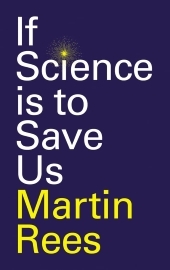If Science is to Save Us

Martin Rees
Polity Press, £20.00
The hook of this book is how science can save us from the various crises that may be coming down the line – from climate catastrophe to artificial intelligence gone rogue. However, this is, really, a treatise from the Astronomer Royal on how to do science well. How to fund and organise research, how to integrate science with policymaking and culture, how to appraise and communicate and improve research. Rees argues that a proper understanding of science is just as critical for the future of humanity as understanding the problems that we face.
The book opens with what the author describes as the ‘mega-challenges’ facing our society: the need to provide food and energy for a growing and more demanding population, the need to harness advances in biotechnology while also coping with the ethical issues that arise with them, and enabling artificial intelligence and the internet to transform society safely.
Rees then takes us on a tour of how science works and the challenges of doing science in the 21st century. He draws on past scientific successes to highlight the ways of working that he believes will be most fruitful in the future.
There are useful and thought-provoking sections on specific aspects of doing science, such as avoiding doom and how best to utilise the always well funded but ethically dubious defence research. There are many practical suggestions for how to get the best out of science for social benefit, from public engagement campaigns to paying teachers more.
Rees’ own personal recollections and anecdotes, and the selected wisdom of other great scientific minds, prevent the text from being too dry. His writing is concise, wise and clear, but the book’s heavy focus on the administration and management of research won’t enthral general readers.
For those in senior roles in science, policy or adjacent fields, there is endless wisdom here. Rees has provided a detailed blueprint for how we create a global scientific system that gives us the best chance of averting the various disasters looming in the future.
Dr Kerry Smith


